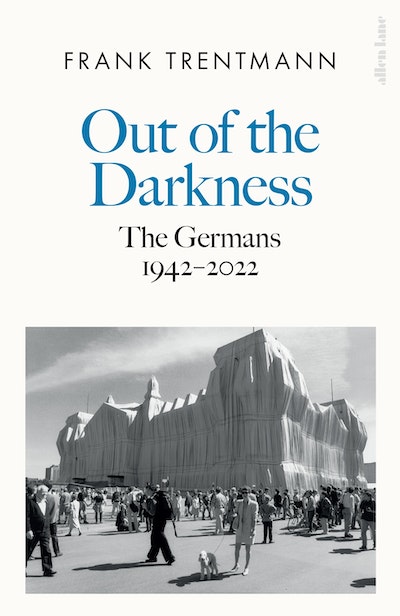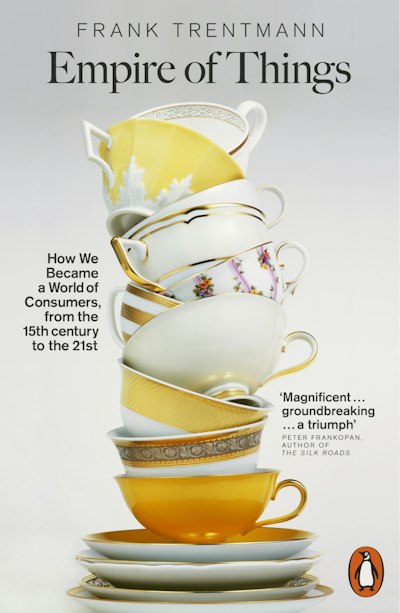- Published: 2 November 2023
- ISBN: 9780241303504
- Imprint: Penguin eBooks
- Format: EBook
- Pages: 880
Out of the Darkness
The Germans, 1942-2022
- Published: 2 November 2023
- ISBN: 9780241303504
- Imprint: Penguin eBooks
- Format: EBook
- Pages: 880
Masterly. Frank Trentmann's wide-ranging, deeply researched, nuanced evaluation of changing German mentalities and moral challenges since the Nazi era is a tour de force
Ian Kershaw, author of Hitler and Personality and Power
In this magisterial book, Frank Trentmann charts how the Germans responded to the moral responsibilities that they faced as perpetrators of a war of annihilation and of the mass murder of the European Jews. Discussing transformations in East and West Germany, Trentmann highlights the trade-offs between moral reorientation and economic reconstruction. Portrayed on a broad canvas, this is a history of post-war Germany for our crisis-ridden times
Benjamin Ziemann, author of Hitler's Personal Prisoner: The Life of Martin Niemöller
Frank Trentmann's rich and brilliant Out of the Darkness traces the moral and material history of Germany since the Second World War through the lives of its people. Wonderfully readable and compelling it introduces us to Christian peaceniks, 'red' militarists, frustrated feminists, unappreciated 'guest workers,' and a host of other unexpected and diverse Germans, illuminating the achievements and failures of the nation that emerged from the Third Reich
Suzanne L. Marchand, author of Porcelain: A History from the Heart of Europe and Down from Olympus
Frank Trentmann’s enthralling account of the Germans since 1942 is rooted in a brilliant insight: that the morality Germans invoked in their struggle to make sense of their place in history was never a transcendent standard, but a malleable and contingent substance whose nature was always contested. This fascinating and compelling moral history takes us to the centre of modern Germany’s self-understanding, moving elegantly between politics, economics, culture and the private reflections of individuals
Christopher Clark, author of The Sleepwalkers and Revolutionary Spring
A milestone in historical writing
Michael Hesse, Frankfurter Rundschau
Excellent ... Trentmann's study marshals an immense amount of evidence in response to a single basic question: how did Germans reassert themselves as morally oriented human beings?
Ben Hutchinson, Times Literary Supplement
Monumental ... a remarkable book ... original and unique insights into the lived history of the Germans ... succeeds like no other history to combine the width and depth of human voices with an overarching narrative ... stimulating, immensely rich and very readable
Frank Biess, Sueddeutsche Zeitung
An impressive account of how Germany built a new identity for itself after the barbaric Nazi years ... terrifically insightful ... This book runs to 838 pages, but barely a word is wasted. Trentmann is a skilful and unflashy storyteller with flickers of gentle irony. Echoing Tolstoy’s theory of history as the "sum of human wills", he aims to stitch the scraps of everyday experience into a quilt of grand narrative. This results in a good deal of richness, colour and subtlety
Oliver Moody, The Times
Outstanding ... A meticulous and well-judged account of Germany from 1942 to today [that] shows how it transformed itself from pariah nation to leader of a continent
Simon Heffer, Daily Telegraph, Best Books of the Year
A great panorama
Hamburger Abendblatt
Compelling ... vivid ... fresh ... one of the most impressive studies I have read of German guilt and shame ... an eloquent and original account of the last eighty years of the country’s history
David Blackbourn, Literary Review
In Out of the Darkness Trentmann does something different and extraordinary. He has composed an account of recent Germany that is not primarily political or economic or social, but moral.. [His] moral history is enormous, but never heavy-going: he is a gifted and intelligent writer
Neal Ascherson, London Review of Books
Absorbing... Frank Trentmann's approach is novel [and] his Germans leap vividly off the page, both as archetypes and as complex, multi-layered individuals... an excellent book
Brendan Simms, New Statesman
Impressive ... shows how German history can be told in a new way
Wolf Lepenies, Die Welt
Trentmann adds another layer to the history of events: the accompanying self-reflection among the Germans, with all their contradictions, their conflicts, their insights and errors. This is original, enlightening and entertaining. We find ourselves in these pages and are amazed!
Gustav Seibt, Süddeutsche Zeitung
A must read!
taz Futur Zwei, Best Books Winter 2023
A lively portrait of German mentalities
Handelsblatt
A fascinating, rich and fluid narrative
Der Spiegel, Books of the Year
A panorama of German mentalities since 1942
Die Zeit, Best Books January 2024
Superb
Stuart Jeffries, Spectator
I could not put the book down. The way Frank Trentmann writes history, the way he brings together things great and small, analysis with narrative, is wonderful
Bernhard Schlink, author of The Reader
Remarkably rich . . . Out of the Darkness usefully reveals the roots of [modern Germany's] ethical knots. Trentmann is still hopeful that Germans can untangle them
Peter Fritzsche, New York Times Book Review
The [postwar] moral remaking of Germany is a complicated tale. It’s a tale that Mr. Trentmann is well placed to tell... He brings to his challenging subject both the sympathy of a native German and the detachment of an outsider... engrossing
Ian Brunskill, Wall Street Journal
Out of the Darkness give[s] a deep insight into how Germany and its people grappled with questions of guilt and identity.... navigates complex issues like self-pity, denazification, immigration, reunification and military intervention with refreshing clarity. This book couldn’t be more timely
Katja Hoyer, BBC History Magazine
Revelatory
Camden New Journal
A lively and very readable portrait of German society… which offers many surprising details and insights
BM, Buch-Magazin
He takes full advantage of the sources and gives voice to many contemporaries
Das Parlament
Masterful
Winnipeg Free Press
[A] rich, ambitious account of Germany’s improbable rise from a moral abyss to a prosperous democracy that is sometimes held up as a bulwark of stability and liberal values… [the book] remains fresh and surprising throughout, thanks in part to Trentmann’s knack for drawing on an astounding range of voices
Washington Post
This history of modern Germany runs to almost 900 pages, but barely a word is wasted. Trentmann is a skilful and unflashy storyteller with flickers of gentle irony. He aims for a grand narrative but I suspect what will live longest in the reader's memory are the vignettes, among them the bourgeois Bundeswehr soldier in Bosnia who believed that the souls of the savage war criminals around him might be redeemed if only he could play them Beethoven's Ninth Symphony.
Oliver Moody, Sunday Times
Trentmann draws from a wide range of sources, including amateur plays and essays by schoolchildren. These lend intimacy to his portrait of a citizenry engaged in the continuous process of formulating its own views of right and wrong as it debates issues from rearmament to environmentalism
The New Yorker




